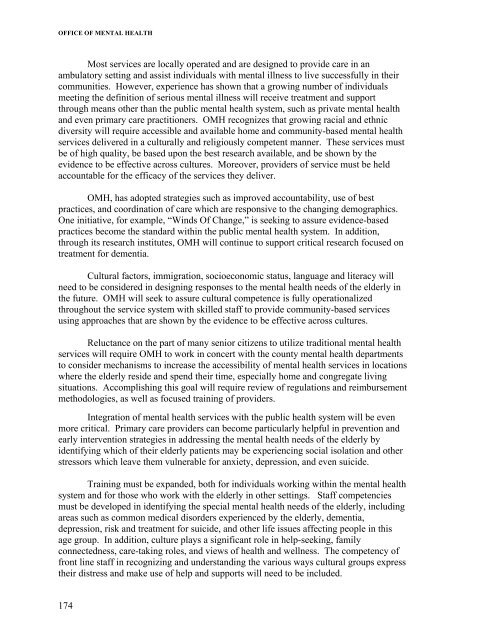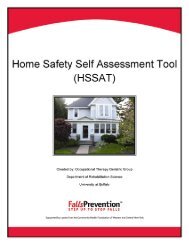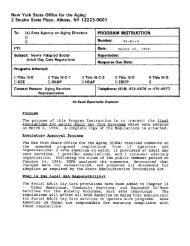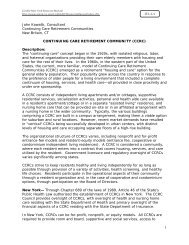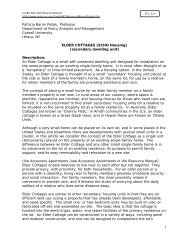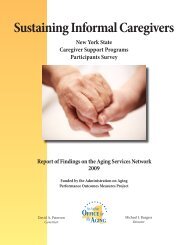White Paper - New York State Office for the Aging
White Paper - New York State Office for the Aging
White Paper - New York State Office for the Aging
- No tags were found...
Create successful ePaper yourself
Turn your PDF publications into a flip-book with our unique Google optimized e-Paper software.
OFFICE OF MENTAL HEALTH<br />
Most services are locally operated and are designed to provide care in an<br />
ambulatory setting and assist individuals with mental illness to live successfully in <strong>the</strong>ir<br />
communities. However, experience has shown that a growing number of individuals<br />
meeting <strong>the</strong> definition of serious mental illness will receive treatment and support<br />
through means o<strong>the</strong>r than <strong>the</strong> public mental health system, such as private mental health<br />
and even primary care practitioners. OMH recognizes that growing racial and ethnic<br />
diversity will require accessible and available home and community-based mental health<br />
services delivered in a culturally and religiously competent manner. These services must<br />
be of high quality, be based upon <strong>the</strong> best research available, and be shown by <strong>the</strong><br />
evidence to be effective across cultures. Moreover, providers of service must be held<br />
accountable <strong>for</strong> <strong>the</strong> efficacy of <strong>the</strong> services <strong>the</strong>y deliver.<br />
OMH, has adopted strategies such as improved accountability, use of best<br />
practices, and coordination of care which are responsive to <strong>the</strong> changing demographics.<br />
One initiative, <strong>for</strong> example, “Winds Of Change,” is seeking to assure evidence-based<br />
practices become <strong>the</strong> standard within <strong>the</strong> public mental health system. In addition,<br />
through its research institutes, OMH will continue to support critical research focused on<br />
treatment <strong>for</strong> dementia.<br />
Cultural factors, immigration, socioeconomic status, language and literacy will<br />
need to be considered in designing responses to <strong>the</strong> mental health needs of <strong>the</strong> elderly in<br />
<strong>the</strong> future. OMH will seek to assure cultural competence is fully operationalized<br />
throughout <strong>the</strong> service system with skilled staff to provide community-based services<br />
using approaches that are shown by <strong>the</strong> evidence to be effective across cultures.<br />
Reluctance on <strong>the</strong> part of many senior citizens to utilize traditional mental health<br />
services will require OMH to work in concert with <strong>the</strong> county mental health departments<br />
to consider mechanisms to increase <strong>the</strong> accessibility of mental health services in locations<br />
where <strong>the</strong> elderly reside and spend <strong>the</strong>ir time, especially home and congregate living<br />
situations. Accomplishing this goal will require review of regulations and reimbursement<br />
methodologies, as well as focused training of providers.<br />
Integration of mental health services with <strong>the</strong> public health system will be even<br />
more critical. Primary care providers can become particularly helpful in prevention and<br />
early intervention strategies in addressing <strong>the</strong> mental health needs of <strong>the</strong> elderly by<br />
identifying which of <strong>the</strong>ir elderly patients may be experiencing social isolation and o<strong>the</strong>r<br />
stressors which leave <strong>the</strong>m vulnerable <strong>for</strong> anxiety, depression, and even suicide.<br />
Training must be expanded, both <strong>for</strong> individuals working within <strong>the</strong> mental health<br />
system and <strong>for</strong> those who work with <strong>the</strong> elderly in o<strong>the</strong>r settings. Staff competencies<br />
must be developed in identifying <strong>the</strong> special mental health needs of <strong>the</strong> elderly, including<br />
areas such as common medical disorders experienced by <strong>the</strong> elderly, dementia,<br />
depression, risk and treatment <strong>for</strong> suicide, and o<strong>the</strong>r life issues affecting people in this<br />
age group. In addition, culture plays a significant role in help-seeking, family<br />
connectedness, care-taking roles, and views of health and wellness. The competency of<br />
front line staff in recognizing and understanding <strong>the</strong> various ways cultural groups express<br />
<strong>the</strong>ir distress and make use of help and supports will need to be included.<br />
174


